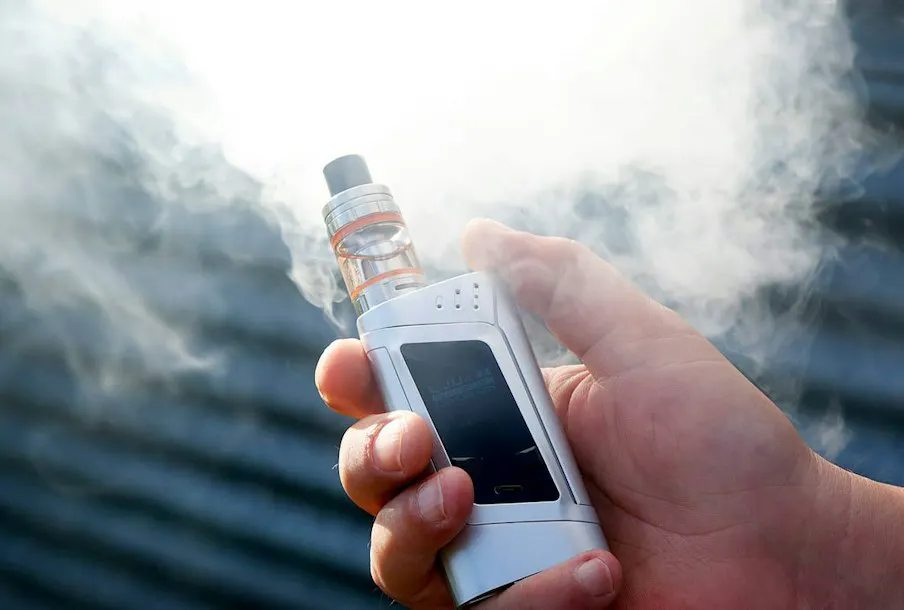Vaper considers cigarettes to access quit help


Stop smoking agencies say their funding is specified to support tobacco smokers, not vapers. Photo: Bevan Conley/NZ Herald.
A Nelson man who quit vaping eight months ago is considering taking the habit back up due to a stop-smoking service refusing to prescribe him nicotine replacement lozenges - something they say they can only give to smokers.
The scenario is the same for other vapers trying to quit the addictive habit, and Nelson Tasman’s local GP spokesperson, Graham Loveridge, says it’s a concern beginning to emerge in our community.
The man, who did not want to be named, says he was a heavy smoker for 15 years and switched to a high-strength vape juice as a means to stop smoking. In April he decided to quit vaping, so went to his GP for patches and 2mg lozenges, as he can’t use gum.
“I only used patches for three days as they kept coming off due to the nature of my work, so I was fully reliant on lozenges.”
A repeat script from the doctor was provided to the chemist.
“During the last few script fills, the pharmacist began asking how many lozenges I was using a day and if they were working for me. I had some stressful things going on in my life, so I thought I was doing well to have not gone back to vaping,” he says.
“They were supportive, but two weeks ago they said they were unable to prescribe me any more lozenges because my baseline nicotine level was too high, or something to that effect. I was told to call Quitline [a Government-funded service to support people to quit smoking tobacco and become smoke-free] for a prescription.”
However, when he rang Quitline the next day, he was told there was no funded help for him in terms of a prescription because he hadn’t smoked a cigarette in the last 12 months.
“They told me I could still make use of their behavioural support processes, but I had to call my GP to get another script. My GP was surprised Quitline couldn’t help, and the pharmacist said they thought it worked on nicotine intake, not how you get it.”
After going back and forth between the chemist and GP, he was eventually prescribed one more box with no repeats. The only way he can now access them is by buying them full-price from the pharmacy or supermarket, but says vaping would cost less.
“I am just about on my last packet. I can’t afford to buy them regularly and I don’t want to go back to vaping, but if I don’t have lozenges, I know I will. I know I’m not there yet in terms of being able to have zero nicotine.”
The man says he feels the only way he can get help is if he starts smoking again.
“That seems so backward to me. Vaping and smoking should be looked at the same. It’s stupid that I’m considering smoking just so I can access the same help that’s available to cigarette smokers.”
Graham says that although vaping can be a way for an addicted smoker to move away from cigarettes, it is still highly addictive and people are finding it difficult to stop.
“The vape industry has been highly successful at promoting vaping as a completely side-effect-free thing to do. We are only now seeing concern emerge that vaping is not completely without its problems, and it may be damaging people’s lungs.”
He says only a certain amount can be done through general practice, but stop smoking services, such as Quitline, are currently more focused on cigarette smoking.
“It’s not really been ramped up for vaping yet. So far, we’ve not seen many people coming seeking help but it’s starting to happen, and we don’t have a focused service for that. We can prescribe nicotine gum and patches - although under the rules they are essentially for cigarette smokers, but most GPs are going to be sympathetic.”
Data from Quitline shows that in the last six months, 90 people from the Nelson Marlborough DHB region have contacted their service for support, with 10 per cent of those calling for support with vaping.
A spokesperson says that last month they started offering a new three-month programme to support people over 18 wanting to quit vaping, who are not smoking tobacco. There is also a programme for those under 18 who want to quit vaping.
The man says that he was offered this service, but it does not include provision for nicotine replacements, which he says he would still need at this stage in his quitting journey.
“It’s almost as if you need to start smoking to get help to quit vaping.”
Another stop smoking programme, Ready Steady Quit, provided by ProCare, says its funding is specified to support tobacco smokers, not vapers.
“Currently, Ready Steady Quit provides support for clients who are tobacco smokers as this is what the funding we receive is specified for. As part of our funding model, we are unable to support vapers who have never smoked or who have been vaping for more than 12 months,” says Bindi Norwell, ProCare Group CEO.
Bindi says they can help some vapers who have used a vape to stop smoking within the past 12 months and provide a phone consult to help with behaviour change.
“At Ready Steady Quit we would welcome a service to support those who are wanting to quit vaping. Ultimately though, we need funding and training to support a service like this. We have started conversations with our funders about this, however, there is no confirmation of funding support at this stage.”
Nelson MP Rachel Boyack says that vaping remains an important smoking cessation tool.
“Particularly as the new coalition government intends to make access to cigarettes and tobacco easier. Nicotine replacement patches, gum and lozenges were designed for smokers and can help people to stop vaping as well.
“Nicotine withdrawals can be very difficult and there are studies underway, to discover better ways to support people to quit vaping.”
Rachel says she plans to follow-up with the Ministry of Health to ask what the best vaping cessation tools may be, and how they might be made available through Quitline.
